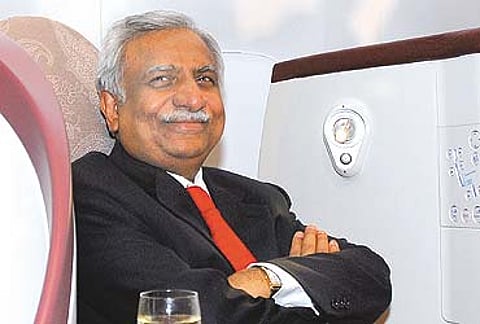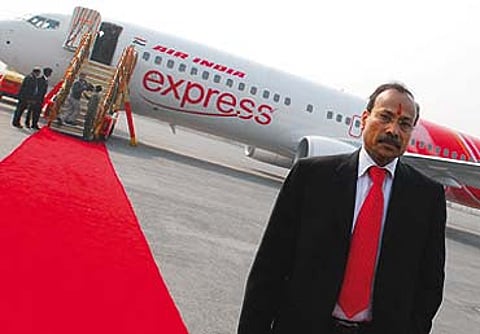Who's The Real Maharajah?
Kingfisher and Jet are going all out in a bid to rule the Indian skies. The royal scion may have to abdicate if it doesn't get new wind.

Even as we write this, Goyal is busy finalising a rights issue to raise $400 million, while Mallya is trying a different route—one which is sure to anger his rival. Kingfisher has evinced an interest in roping in a foreign partner, with Mallya open to diluting his stake to 51 per cent. In fact, he has already received an investment proposal from a "major investor". But there's a small hitch: there's a ban now on foreign direct investment (FDI) in domestic airlines. Mallya, ever resourceful, has lodged a formal protest with the government on this count. Fortunately, he has the finance ministry on his side.
Although the new civil aviation policy—which is yet to be cleared by the group of ministers (GoM)—has persisted with the bar on FDI, the finance ministry has questioned it. The revenue department has told the aviation ministry that the new policy does not reflect the government's position of eventually allowing foreign carriers to pick up stakes in domestic airlines. "The rationale for the blanket embargo is not clear and needs to be elaborated...the civil aviation ministry's argument for not allowing foreign carriers is unclear," stated the revenue department's note.
Industry consultants agree that the existing protection for domestic airlines should go. "This absurd lacuna is a hangover from the old days when the private domestic airlines had demanded it. The situation is different now, Indian carriers are in a desperate need to raise capital," feels Ernst & Young's Jayesh Desai. He thinks that once FDI is allowed, foreign institutional investors are likely to follow. "Warburg Pincus invested in Airtel only after SingTel picked up a stake in the Indian telecom firm," he points out.
Another clause that irks Mallya is the stipulation that only domestic carriers that have been in operation for five years are eligible to ply global routes. This implies that apart from the state-owned Air India-Indian combine, only Jet qualifies. "When new start-ups are allowed to operate from abroad to India, why should an airline from India not be given the same facility?" questioned Mallya while talking to the media on the sidelines of the Airport and Airline conference in Vancouver.
But Mallya isn't deterred by the policy, he's already placed an order for wide-bodied aircraft used on long-haul international routes. The first of this lot, an A-330, will be delivered in March 2008. "The wide-body aircraft will not sit on the ground. If the Indian government does not give us permission to operate in the international skies, we may fly from the US to India," said Mallya. The Kingfisher chairman has set up Kingfisher International Airlines in the US, and hopes to submit his application to American authorities in the next 6-8 weeks. International operations are slated to start by end-2007.
But even if Mallya launches global routes, Jet will still have an edge over Kingfisher, at least initially. E&Y's Desai agrees there is "real money" to be made on international routes, but only if the airlines has a critical control over hubs. In this respect, Jet is ahead as it has launched its European hub in Brussels—for flights from six Indian cities, and onwards to the US, Canada, and other European destinations. Jet chose Brussels because it couldn't get slots at London Heathrow.
Ironically, Goyal and Mallya are on the same side when it comes to AI-Indian's monopoly over the profitable Gulf routes. Both want this to go even before the 2007-end expiry date (but AI-Indian has asked for a two-year extension). If V. Thulasidas, head of the state-owned merged entity, manages to swing the decision in his favour, AI-Indian could be among the top 30 global carriers, taking on giants like Singapore Airlines and British Airways, rather than spar with 'puny' Jet and Kingfisher.

Apart from the policy-related issues, the three corporate pilots have to manage their M&As (mergers and alliances) too. For synergies in combined operations will be critical to success. Thulasidas also has to force his organisation to shrug off the 'public sector baggage'. The AI-Indian merger is now being mooted on a decentralised model: float different subsidiaries to handle different functions and operations. This will include a full-service airline, low-cost one (Air India Express is a low-cost global airline), cargo airline, a ground-handling division and a maintenance-related unit.
Jet, meanwhile, aims to transform Sahara into a 'value' carrier, under the new brand JetLite. "We'll have an operating cost equal or lower than any low-cost carrier. It will offer the right price at the right time. Pricing strategies will be employed to meet load factor targets, but the Re 1 fare won't be a part of our approach. We'll serve food onboard... another source of value will be that JetLite is owned by Jet Airways, which is known for its efficiency and reliability," explains G. Kingshott, acting CEO, JetLite.
In addition, says Kapil Kaul, CEO (India), Centre of Asia Pacific Aviation (CAPA), Goyal will have to develop "a new network strategy to optimise the operations of Jet Airways and JetLite. The challenge for network planners would be to redeploy the (88 aircraft) fleet to achieve higher productivity and revenue potentials." On the positive side, the Jet-Sahara merger could help Goyal set up the classic hub-n-spoke network system on international routes and provide it with better global positioning. "After the merger, Rs 150-200 crore of costs will go immediately," adds Desai, who advised Sahara.
Mallya, who maintains that Kingfisher-Air Deccan will save a minimum of Rs 300 crore in the first year itself, needs to discuss pricing with Capt Gopinath, MD, Air Deccan. After endless denials, Gopinath agreed to Mallya acquiring a 26 per cent stake in Air Deccan. "Mallya made one comment, which triggered the deal. He said he wanted to invest in Air Deccan, rather than a merger. He added that if I went with other investors, who were talking to me, there would be a bloodbath. Now he'll pump in the money and allow me to fulfil my dream of building a people's airlines," explains Gopinath.
But it's going to be quite tricky for both Mallya and Gopinath. As the latter admits, "One of the reasons for Air Deccan's low yields was that as soon as it raised fares, forward bookings fell." So if the airline hikes its prices—as it has done over the past two weeks, to a minimum Rs 650 on some routes—it may prove disastrous. Reason: this may eat into load factors, and break-even load factors are much higher for low-cost airlines. Maybe Air Deccan will adopt a JetLite kind of a model, or go slow on the fare hike.
So who'll emerge victorious in this battle for the Indian skies? "Only a leader who can attract huge investments, and build a strong management team will be able to rule the roost in the Indian aviation market," predicts Desai. Of the three, Mallya is a maverick, Richard Branson-like liquor baron, who believes in delegating responsibilities and can raise funds in a jiffy as he has done for acquiring breweries abroad. He is ambitious, confident, and willing to throw money to emerge as the leader.
Goyal is a micro-manager, who will not give up what he has achieved. Although he may not be a charmer like Mallya, he has built India's most efficient airline and has been successful in a sector where services matter the most. He has the money, first-mover advantage, and considerable clout in the corridors of power. Although the stockmarket may not believe in him—the scrip price is down after the Sahara acquisition—he believes in his abilities to become the market leader.
Last but not least is the dark horse, Thulasidas. Everyone's given up on him, and Desai says AI-Indian with itsPSU mindset is "not a serious contender". But it has the best ingredients—the most modern and the largest fleet, the requisite infrastructure and the slots, near-monopoly over lucrative international routes, and the financial clout to give any competitor a run for their money. If Thulasidas plays his cards well, and at the right time, he may well leave the other two way behind.
Three different personalities, three diverse organisations, three varying business strategies. But with one objective: to woo Indian and foreign passengers. This airshow will be worth the watch.
Tags